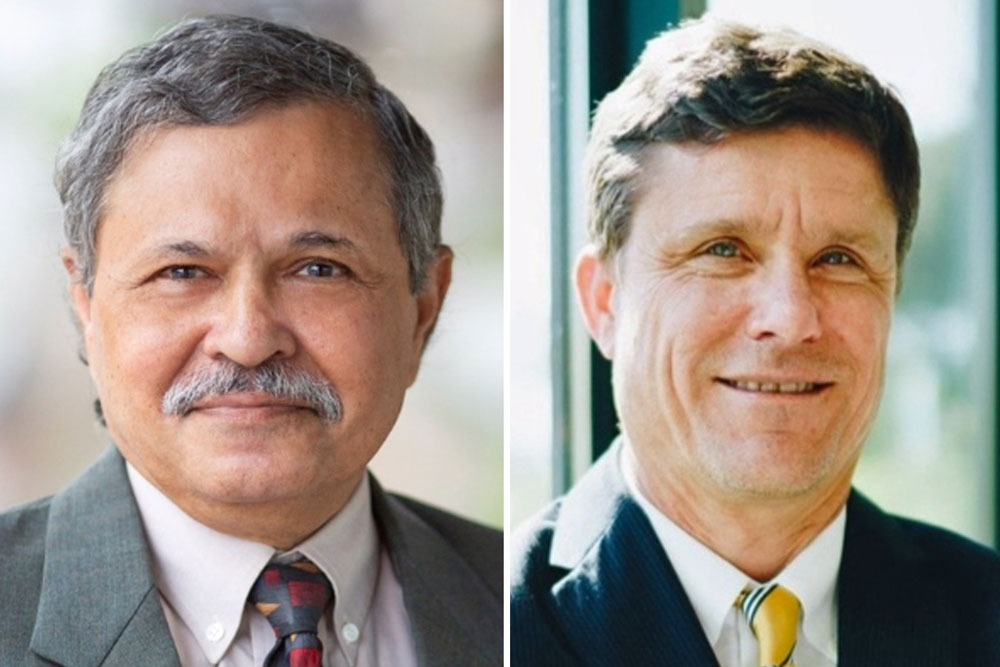The two finalists vying for the role of Santa Barbara City College’s next superintendent/president fielded tough audience questions at public candidate forums Thursday, thrusting the college’s equity controversies and severe budget cuts back into the spotlight.
The candidates, Dr. Utpal Goswami, president of Metropolitan Community College Maple Woods in Kansas City, Missouri, and Dr. Kenneth Lawson, vice president of instruction at Skagit Valley College in Mount Vernon, Washington, were freely questioned by faculty and staff, students, and other members of the public at the college’s Garvin Theatre.
“I’d like to address the not one elephant, but herd of elephants in the room,” said one faculty questioner. “From a dropping campus morale to documented distress in administrative leadership and discord on issues of equity, in many respects we are at a low point.”
Last year, the school — considered one of the top community colleges in the country — was hit with a number of high-profile controversies. This year, the college’s previous leader abruptly retired amid the chaos for health reasons, and the current interim leader, Dr. Helen Benjamin, conducted an anonymous campus climate survey last month that revealed the overall campus culture is “unhealthy” and “highly polarized.” In addition to the rampant social issues on campus, the college is also grappling with a $3.2 million deficit, leaving massive shoes for the finalist to fill.
“It would be difficult and challenging to step into this role,” the faculty member continued. “What concrete steps would you take to address this?” The question was asked of both candidates, who were each given an hour onstage to answer their questions separately.
“I’m a firm believer in keeping the lines of communication open,” Goswami responded. “I also believe you cannot bring change without creating trust.” Goswami repeatedly cited communication and trust as his main points when it came to issues of race, gender, and other equity issues the college has dealt with in the past year. Each candidate received about five questions addressing the college’s equity issues.
Goswami said at his current college in Kansas City, he conducts an annual campus climate survey similar to the one SBCC did over the summer, and his college’s scores are consistently improving each year because of the trust and communication.
Lawson was hit with similar questions on college equity, but he got much more personal with his responses than Goswami did. He said that although he “can check every privilege box: white, male, and heterosexual,” he fully understands the issues because his own two children are mixed-race in addition to his daughter having a learning disability.
He also said that his grandfather, who is buried in Santa Barbara, made education a priority, and as a result, college was a requirement, not an option, for Lawson.
“Frankly, I want to do right by my grandpa and honor the fact that I have these privileges and use them to do good in the world,” Lawson said. He added that the equity and social justice department at his current college in Mount Vernon “schooled me really well.”
Goswami’s responses were more conceptual in nature than Lawson’s, who gave tangible solutions for how to handle the equity issues.
“Maybe we have lost the art of dialogue,” Goswami said in response to the college’s equity turmoil. “We are very good at debating but not so good at dialogue, so we need to model it. These are very complex issues, so I can’t stand here and say here’s one, two, three ways to solve it. ”
Lawson did suggest ways to solve it, though. He said he increased the faculty-of-color ratio at his college by 11 percent, and that he believes SBCC needs to “have staff and faculty who match the diversity of our students.” He also said the curriculum and pedagogies need to reflect students of color, too, and he would have monthly meetings with students and faculty to address it.
When it came to fiscal issues, Goswami appeared to have more experience. He cited his extensive background in fundraising and said he would do the same at SBCC.
“I’ve helped build over 20 programs; 18 or 19 of them were funded through external sources,” Goswami said. “Given the budget situation we face, most institutions don’t introduce new programs without cutting other ones. I don’t think we have to do that here.” He gave a “ballpark” estimate of the amount of funds he’s raised for college programs — between $18 and $20 million.
Lawson, however, said the fundraising efforts should be left to the SBCC Foundation to handle.
“The Washington funding model isn’t much different than California’s,” Lawson said. “I think the role of the president is to be in the community and maintain relationships with the community donors. I would leave it up to the experts to do the asking for money.” He also cited grants and the college’s School of Extended Learning as additional sources of revenue to make up for the budget cuts.
The SBCC Board of Trustees will hold final interviews with Goswami and Lawson in a closed session on October 25. They will announce the new superintendent/president early November, and he will start in his role January 2020.

